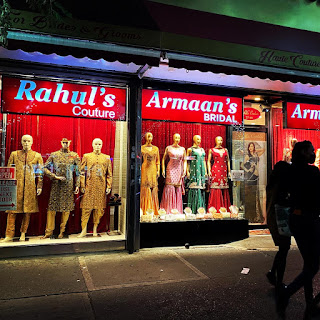A walk through Jackson Heights reveals crisp night air, Saturn and Jupiter in the sky, masked faces, lit-up trees, and the vibrancy of 74th Street.
What was supposed to be a walk to increase my daily steps turned into a journey. People pop out. Restaurants offer outside seating. The night is crisp. Saturn and Jupiter are still visible in the sky — on the way to convergence. I wanted to get more faces in my photographs. But the moments passed by too quickly. I saw a masked guy in a cab. He was balefully looking out a window. The Q49 bus runs along 74th Street. Wear your mask.
Today in class an adolescent pupil couldn’t answer a question — so she said to me, “This question makes me feel unsafe.” I was taken aback by her statement. It’s the Covid. I imagined her shrieking out of class. By an unsafe question. I’m teaching a course on mythology. And one characteristic of myth is the unknown. So I get it, girl. Stuff gets real. From chaos to calm. From the womb to the tomb.


















.jpg)



